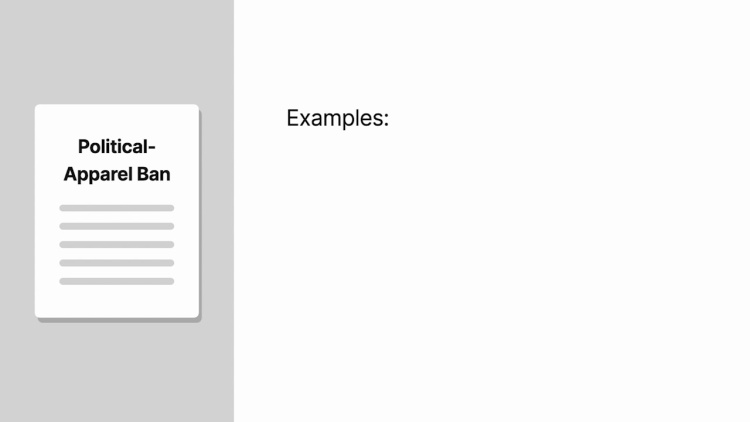Minnesota Voters Alliance v. Mansky
United States Supreme Court
138 S. Ct. 1876 (2018)
- Written by Abby Roughton, JD
Facts
A Minnesota statute banned wearing political apparel—defined as political badges, political buttons, or other political insignia—inside polling places on Election Day. The statute purportedly served the state’s interest in avoiding distractions and disruptions in polling places. The statute did not define the term “political,” but the state asserted that the ban prohibited words and symbols that conveyed a message about the electoral choices being made in the polling places. According to the state, prohibited words and symbols included (1) issue-oriented material about subjects on which political candidates or parties had taken a stance and (2) items promoting groups that had well-known and recognizable political views about issues that voters would be deciding in the election. The Minnesota Voters Alliance (MVA) and other individuals and organizations (plaintiffs) brought an action against Minnesota officials including Joe Mansky (defendants), claiming that the statute violated the First Amendment. The district court granted summary judgment in the state’s favor, and the appellate court affirmed. The United States Supreme Court granted certiorari. At oral argument before the Supreme Court, the state’s counsel had difficulty explaining clear standards for whether certain items of apparel would be prohibited. For instance, counsel indicated that an “All Lives Matter” shirt was likely impermissible because it could be perceived as political, but a shirt with a rainbow flag could be worn unless there was an issue somehow related to gay rights on the ballot. Counsel also indicated that a shirt with the National Rifle Association’s name or the text of the Second Amendment was prohibited, while a shirt quoting the First Amendment was permissible. In its decision, the Supreme Court first concluded that polling places are nonpublic forums in which the government can impose reasonable and viewpoint-neutral content-based restrictions on speech. The Court then considered whether Minnesota’s political-apparel ban was reasonable.
Rule of Law
Issue
Holding and Reasoning (Roberts, C.J.)
What to do next…
Here's why 904,000 law students have relied on our case briefs:
- Written by law professors and practitioners, not other law students. 47,100 briefs, keyed to 995 casebooks. Top-notch customer support.
- The right amount of information, includes the facts, issues, rule of law, holding and reasoning, and any concurrences and dissents.
- Access in your classes, works on your mobile and tablet. Massive library of related video lessons and high quality multiple-choice questions.
- Easy to use, uniform format for every case brief. Written in plain English, not in legalese. Our briefs summarize and simplify; they don’t just repeat the court’s language.





